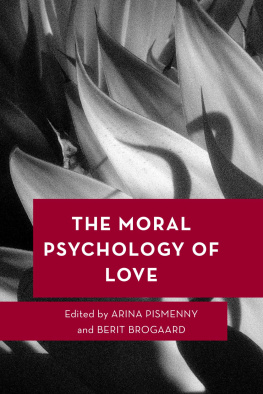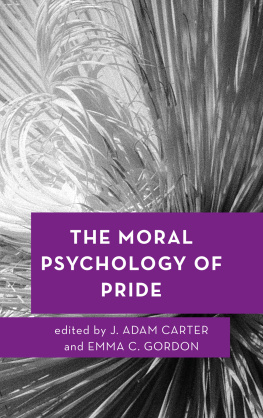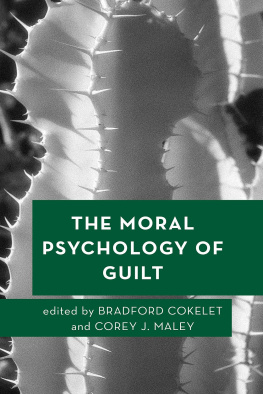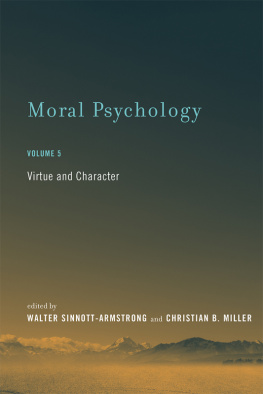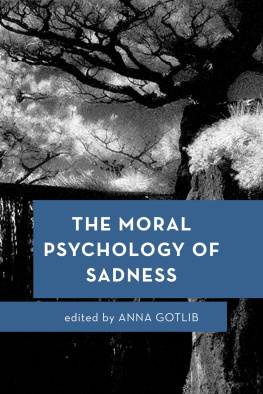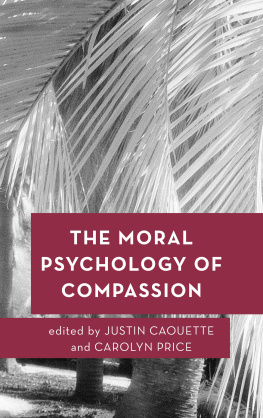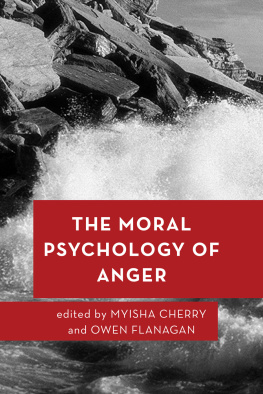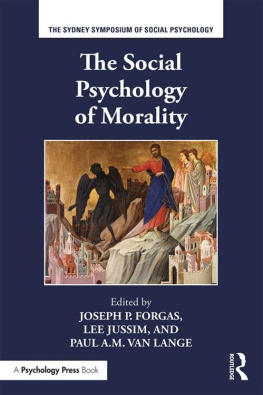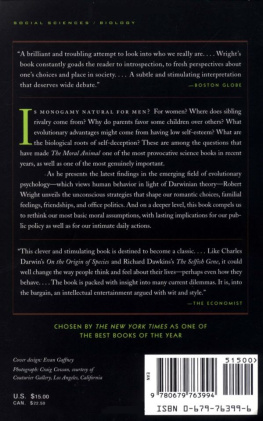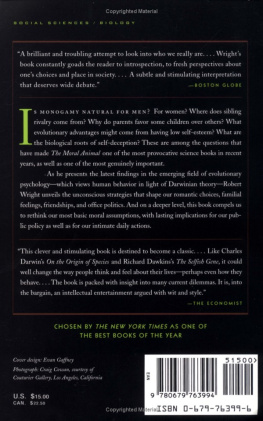Arina Pismenny - The Moral Psychology of Love
Here you can read online Arina Pismenny - The Moral Psychology of Love full text of the book (entire story) in english for free. Download pdf and epub, get meaning, cover and reviews about this ebook. year: 2022, publisher: RowmanLittlefield, genre: Science. Description of the work, (preface) as well as reviews are available. Best literature library LitArk.com created for fans of good reading and offers a wide selection of genres:
Romance novel
Science fiction
Adventure
Detective
Science
History
Home and family
Prose
Art
Politics
Computer
Non-fiction
Religion
Business
Children
Humor
Choose a favorite category and find really read worthwhile books. Enjoy immersion in the world of imagination, feel the emotions of the characters or learn something new for yourself, make an fascinating discovery.
- Book:The Moral Psychology of Love
- Author:
- Publisher:RowmanLittlefield
- Genre:
- Year:2022
- Rating:4 / 5
- Favourites:Add to favourites
- Your mark:
- 80
- 1
- 2
- 3
- 4
- 5
The Moral Psychology of Love: summary, description and annotation
We offer to read an annotation, description, summary or preface (depends on what the author of the book "The Moral Psychology of Love" wrote himself). If you haven't found the necessary information about the book — write in the comments, we will try to find it.
The Moral Psychology of Love — read online for free the complete book (whole text) full work
Below is the text of the book, divided by pages. System saving the place of the last page read, allows you to conveniently read the book "The Moral Psychology of Love" online for free, without having to search again every time where you left off. Put a bookmark, and you can go to the page where you finished reading at any time.
Font size:
Interval:
Bookmark:

The Moral Psychology
of Love
Moral Psychology of the Emotions
Series Editor: Mark Alfano, Associate Professor of Philosophy, Macquarie University
How do our emotions influence our other mental states (perceptions, beliefs, motivations, intentions) and our behavior? How are they influenced by our other mental states, our environments, and our cultures? What is the moral value of a particular emotion in a particular context? This series explores the causes, consequences, and value of the emotions from an interdisciplinary perspective. Emotions are diverse, with components at various levels (biological, neural, psychological, social), so each book in this series is devoted to a distinct emotion. This focus allows the author and reader to delve into a specific mental state, rather than trying to sum up emotions en masse. Authors approach a particular emotion from their own disciplinary angle (e.g., conceptual analysis, feminist philosophy, critical race theory, phenomenology, social psychology, personality psychology, neuroscience) while connecting with other fields. In so doing, they build a mosaic for each emotion, evaluating both its nature and its moral properties.
Other Titles in This Series
The Moral Psychology of Forgiveness, edited by Kathryn J. Norlock
The Moral Psychology of Pride, edited by Adam J. Carter and Emma C. Gordon
The Moral Psychology of Sadness, edited by Anna Gotlib
The Moral Psychology of Anger, edited by Myisha Cherry and Owen Flanagan
The Moral Psychology of Contempt, edited by Michelle Mason
The Moral Psychology of Compassion, edited by Justin Caouette and Carolyn Price
The Moral Psychology of Disgust, edited by Nina Strohminger and Victor Kumar
The Moral Psychology of Gratitude, edited by Robert Roberts and Daniel Telech
The Moral Psychology of Admiration, edited by Alfred Archer and Andr Grahle
The Moral Psychology of Regret, edited by Anna Gotlib
The Moral Psychology of Hope, edited by Claudia Blser and Titus Stahl
The Moral Psychology of Amusement, edited by Brian Robinson
The Moral Psychology of Boredom, edited by Andreas Elpidorou
The Moral Psychology of Love, edited by Arina Pismenny and Berit Brogaard
The Moral Psychology
of Love
Edited by
Arina Pismenny and Berit Brogaard
ROWMAN & LITTLEFIELD
Lanham Boulder New York London
Published by Rowman & Littlefield
An imprint of The Rowman & Littlefield Publishing Group, Inc.
4501 Forbes Boulevard, Suite 200, Lanham, Maryland 20706
www.rowman.com
Selection and editorial matter Arina Pismenny and Berit Brogaard 2022.
Copyright in individual chapters is held by the respective chapter authors.
All rights reserved. No part of this book may be reproduced in any form or by any electronic or mechanical means, including information storage and retrieval systems, without written permission from the publisher, except by a reviewer who may quote passages in a review.
British Library Cataloguing in Publication Information Available
Library of Congress Cataloging-in-Publication Data
Names: Brogaard, Berit, editor. | Pismenny, Arina, 1985- editor.
Title: The moral psychology of love / edited by Berit Brogaard and Arina Pismenny.
Description: Lanham : Rowman & Littlefield, [2022] | Series: Moral psychology of the emotions | Includes bibliographical references and index. |
Summary: This book will explore the moral dimensions of love from the standpoint of political philosophy, psychology, and neuroscienceProvided by publisher.
Identifiers: LCCN 2021062438 (print) | LCCN 2021062439 (ebook) | ISBN 9781538151006 (cloth ; alk. paper) | ISBN 9781538151013 (ebook)
Subjects: LCSH: LoveMoral and ethical aspects. | LovePhilosophy.
Classification: LCC BF575.L8 M67 2022 (print) | LCC BF575.L8 (ebook) | DDC 152.4/1dc23/eng/20220111
LC record available at https://lccn.loc.gov/2021062438
LC ebook record available at https://lccn.loc.gov/2021062439
 The paper used in this publication meets the minimum requirements of American National Standard for Information SciencesPermanence of Paper for Printed Library Materials, ANSI/NISO Z39.48-1992.
The paper used in this publication meets the minimum requirements of American National Standard for Information SciencesPermanence of Paper for Printed Library Materials, ANSI/NISO Z39.48-1992.
For our lovers and teachers
Arina Pismenny and Berit Brogaard
Ronald de Sousa
Donatella Marazziti and Alessandra Della Vecchia
Katherine Aumer and Michael A. Erickson
Robert J. Sternberg
Bianca P. Acevedo
Aaron Ben-Zeev
Luke Brunning
Gen Eickers
Lotte Spreeuwenberg
Raja Halwani
Arina Pismenny and Berit Brogaard
Caroline R. Lundquist
Jennifer L. Piemonte, Staci Gusakova, Jennifer D. Rubin, and Terri D. Conley
We are very grateful to our contributors and our editors at Rowman and Littlefield for their patience and hard work during the Covid-19 pandemic.
A very special thanks to our bright and diligent research assistant, Marriah Alcanatara, who has been a tremendous help in putting this volume together.
We are also grateful to Mark Alfano, Rebecca Britney Brogaard, Nol Carroll, Ronald de Sousa, Deepak Devjani, John Doris, Konstantinos Fotiou, Christopher Grau, John Greenwood, Aleks Hernandez, Sarah Levinson, Hichem Naar, Olga Pismenny, Jesse Prinz, Mark Sisti, Eric Slosberg, Aaron Smuts, Ardit Xholi, and our students for insightful discussions on this topic, and for their unwavering support.
Arina Pismenny and Berit Brogaard
Love is a misunderstanding between two fools.
Oscar Wilde
Love has nothing to do with what you are expecting to getonly with what you are expecting to givewhich is everything.
Katherine Hepburn
True love comes quietly, without banners or flashing lights. If you hear bells, get your ears checked.
Erich Segal
The clich if you havent loved, you havent lived conjures up about 512 million Google search results. The clichs popularity attests to the importance and diversity of roles that love plays in our lives. Love is thought to be a fulfilling experience not only because it is often pleasant (when it isnt excruciatingly painful) but also because it aims to forge connections with others, brings meaning to our lives, and often feels like an indispensable ingredient of happiness. At the same time, love is hemmed with imperatives and taboos that imbue it with numerous often-contradictory social meanings: love is blind versus love is seeing clearly, all is fair in love and war versus love is kindness, if you love them, never let them go versus if you love them, set them free. These different love-narratives create a complex set of normative constraints reflected in cultural attitudes toward love. These attitudes are embedded in the minds of individuals and guide their experiences and practices of love. These love-narratives specify the appropriate circumstances, objects, ways of feeling, expressing, and acting in love. Due to their widely accepted status and normative force, the resulting attitudes and expectations are often felt as commands. And these commands are often rendered as moral imperatives.
This suggests several questions: To what extent are moral concerns a part of love itself? What makes love good or bad? What makes love morally praiseworthyif or when it is? What role can and should moral considerations play in love? We might ask similar questions about practical or prudential concerns: When is love good or bad for us, our life goals, people and things we care about, the society at large? The answers to prudential questions might conflict with the answers to moral ones.
Next pageFont size:
Interval:
Bookmark:
Similar books «The Moral Psychology of Love»
Look at similar books to The Moral Psychology of Love. We have selected literature similar in name and meaning in the hope of providing readers with more options to find new, interesting, not yet read works.
Discussion, reviews of the book The Moral Psychology of Love and just readers' own opinions. Leave your comments, write what you think about the work, its meaning or the main characters. Specify what exactly you liked and what you didn't like, and why you think so.

